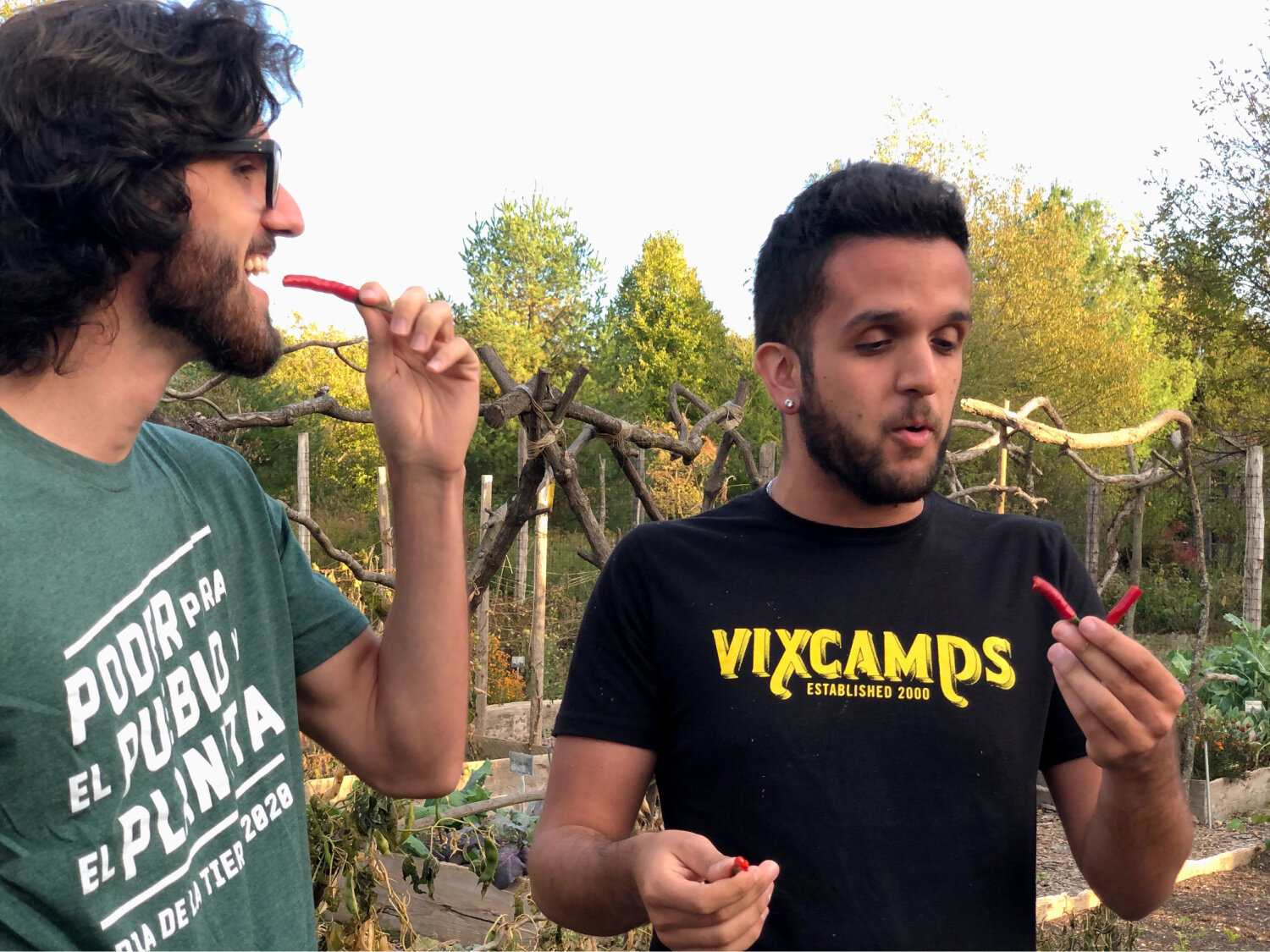Among the many plants we’ve been experimenting with here at Laurentide, one is hot peppers. A couple years ago, Walter decided to create a pepper with the flavor of a habanero but in a more slender form and with slightly less heat. His first try came out small and wimpy, so he kept cross pollinating. What you see in the photo above is Walter’s fourth generation pepper, and they’ve definitely got some fire.
We’ve named them Tejo peppers, after the popular Colombian game involving alcohol, metal balls, and gunpowder.
The son on the left, Atticus, lived in Colombia, and he describes Tejo as a more dramatic version of the midwestern Cornhole. Both are played outside, both are team sports that involve standing in place and tossing a projectile, and neither would be complete without a beer in hand. The difference is that in Tejo, instead of sacks, the projectile is a ball of lead. And instead of trying to get your sack through a hole, the goal in Tejo is to get your ball of lead to explode a shell of gunpowder. What’s not to love?
The son on the right, George, is what you would call a norm breaker. He jumps into freezing cold Lake Michigan when no one else will. He dances in public squares when no one else will. He crosses lines so that the rest of us can follow. And here he is, doing it with the Tejo peppers.
Truthfully, he has an iron gullet. When he was two, he threw a tantrum on an airplane, and it wasn’t until I traded him my ham on rye with Dusseldorf mustard for his chicken nuggets and my black coffee for his chocolate milk that he settled down. When he was four, he ate wasabi peas in his cereal like they were Lucky Charms. When he was six, he accompanied our neighbors to their country club for a posh Fourth of July fête where somehow, going through the buffet line, he nabbed the bowl of sliced onions meant for the burgers, took it back to his picnic blanket and snarfed down those raw babies as our neighbors stared, transfixed.
George found these peppers a tad hotter than expected. He ate three of them and got, for the first time in his young life, wrinkles on his forehead. Maybe that is how we age. Our skin reacts like the surface of water when something disrupts the usual flow.
See the spindly stalks and decaying leaves? The outdoor garden is done now. Other than a few beds of cabbages and swiss chard, the outdoor growing season has ended. We’ve sown some baby spinach and other greens in the hoop houses. Tomatoes are doing well in there too. But our first season at Laurentide is fini and the sadness I feel is real. Like a baby outgrowing his crib.
Autumn by Louise Glück
The part of life
devoted to contemplation
was at odds with the part
committed to action.
*
Fall was approaching.
But I remember
it was always approaching
once school ended.
*
Life, my sister said,
is like a torch passed now
from the body to the mind.
Sadly, she went on, the mind is not
there to receive it.
The sun was setting.
Ah, the torch, she said.
It has gone out, I believe.
Our best hope is that it’s flickering,
fort/da, fort/da, like little Ernst
throwing his toy over the side of his crib
and then pulling it back. It’s too bad,
she said, there are no children here.
We could learn from them, as Freud did.
*
We would sometimes sit
on benches outside the dining room.
The smell of leaves burning.
Old people and fire, she said.
Not a good thing. They burn their houses down.
*
How heavy my mind is,
filled with the past.
Is there enough room
for the world to penetrate?
It must go somewhere,
it cannot simply sit on the surface—
*
Stars gleaming over the water.
The leaves piled, waiting to be lit.
*
Insight, my sister said.
Now it is here.
But hard to see in the darkness.
You must find your footing
before you put your weight on it.




